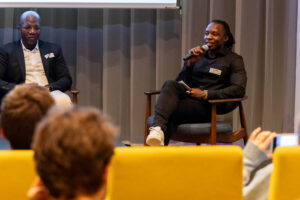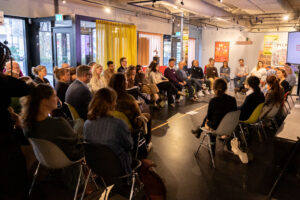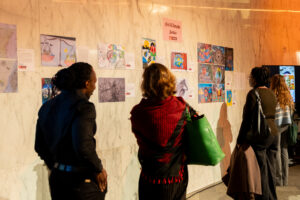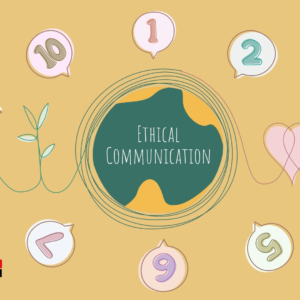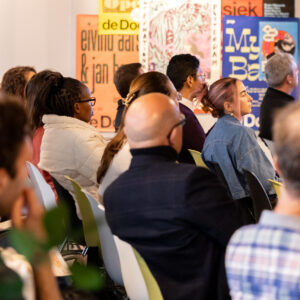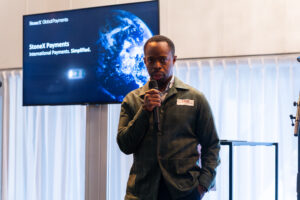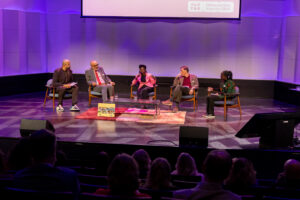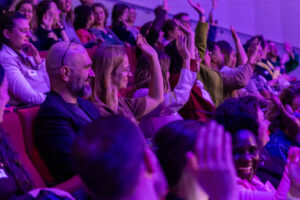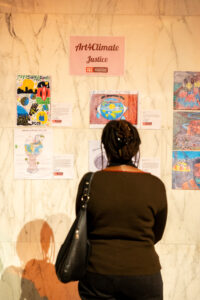
Watch the aftermovie here!
Official launch of the Power of Partnerships publication
We began the day with the official launch of the Power of Partnerships, by officially presenting the publication to the Ministry of Foreign Affairs. This publication celebrates what has been achieved during five years of Strategic Partnerships, capturing 27 stories of civil society’s role in driving change and navigating challenges. During the panel discussion that followed, the power of working together was emphasised. One significant conclusion is that partnerships deliver concrete results. By bringing together different types of organisations, they amplify the voices and perspectives of local communities and contribute to policy and system change. While concern was expressed about the end of these partnerships due to diminishing funding and broader pressure on international cooperation worldwide, the panellists were hopeful about the future. What has been built over the past five years will continue: structures, networks, and relationships are in place, and communities know they can claim space, speak up, and influence.
Read how investing in a strong, inclusive civil society can create systemic change!
Community leadership as decision-making power
The Innovation Impulse invited participants to reflect on how NGOs can genuinely shift power toward equity and local autonomy. In the session “NGOs Are Part of the Problem; What should we do to be part of the solution?”, speakers called on northern NGOs to show humility: step back where needed, stop competing with local actors for funding, and support locally driven change.
These ideas deepened in the session on community-led climate justice. CARE posed a key question: “If communities are visible in our meetings and pictures, but invisible in final decisions, who is really leading the project?” True community leadership means not only involving communities but ensuring they hold real decision-making power.
In the session ‘Between Dawn & rise: Re-imagining “narratives” in International solidarity’ we further explored what transformation is necessary to realize alternative systems of international cooperation.
“If communities are visible in our meetings and pictures, but invisible in final decisions, who is really leading the project?” – CARE
DEI in times of global anti-rights movements
Building on the call for deeper, community-led approaches, other sessions turned to a pressing question: how do we protect inclusion and rights in a world where DEI efforts are increasingly restricted?
In “Fighting back: cross-context strategies on countering the anti-rights movement”, participants noted that many majority-world countries have extensive experience navigating authoritarian or constrained civic spaces, offering valuable lessons. INGOs from global minority countries play a crucial role in addressing transnational movements that undermine fundamental rights, both in their own context and globally, given also that many such movements are based in, and funded from, the Global North. During this session, Margit van Wessel of Wageningen University stated: “In light of the localisation, decolonisation, shift the power movements, organisations in global minority countries have become shy about their power. The time to step back is not on all fronts in all spaces; it is also time to capitalise on power [to fight against anti-rights actors].”
Next to all the speeches, panels and discussions, there was also space for art. But, as you can imagine, art with a focus on inclusivity. In Speels Collectief’s theatre performance, the value of inclusivity and representation was immediately evident. This collective, composed of (ex-)sex workers and clients, played their powerful performance Love Me By The Hour. Hereafter, Aidsfonds and Red Umbrella Fund shared their reflections on advocating for sex workers’ rights in an international environment. This session was a true testament to how art and theatre can be key in shifting narratives and opening minds. The sex worker movement was highlighted as a clear example of why communities must be centred in storytelling, decision-making, and funding.
Communication: Hope-based, inclusive stories that stick!
We had the privilege of having Thomas Coombes as our keynote speaker, who applies brain science to human rights and social change. He addressed the way the brain works. By addressing fake news, you’re only reinforcing it. Just as saying “don’t think of an elephant” does not work, arguing about fake news only leads to remembering something about the fake news (as in the elephant). What we can do, is alter the way of thinking to a positive way. Instead of telling people what we hate and what is wrong, we must spread the things we love and show people what alternatives would look like. The question of how to tell stories that truly stick and move people to action was further explored during the workshop ‘How To Tell a Story That Sticks’, in which participants explored how emotion, identification, playfulness, and personal efficacy help create stories that truly resonate.
In the last workshop, Wouter Oomen of the Expertise Centre on Humanitarian Communication (HUCOM) spoke on Inclusive Communication. In the previous three-and-a-half years, the Partos Community of Practice on Inclusive Communication and Wouter Oomen and Emiel Martens of HUCOM, have learned and explored together about Inclusive Communication. This has led to 3 Future Briefs and an Inclusive Communication Guide, including a glossary and 10 guiding principles for inclusive communication. In this last workshop, we launched the video about the 10 guiding principles.
Business Solutions Square & Women’s Rights Rally
In addition to the above-mentioned sessions, we also included a variety of interactive activities in the main foyer. The Innovative Business Solutions Square showcased a dynamic range of innovative approaches to help (I)NGOs navigate new realities and unlock alternative pathways for growth. Experts from HVFC-International, StoneX, impactID, and Impact House by Grant Thornton shared their insights and hands-on experience on topics such as fundraising pitfalls, diversification of social entrepreneurship, and best practices for local currency payments. And during the after-drinks, many participants raced on the tracks during WO=MEN’s women’s rights rally. This race shows the need to support women’s rights and gender equality worldwide. You can sign their appeal to the future cabinet, “Full speed ahead for Women’s Rights!“, on their website!
The Innovation Impulse showed how much energy, creativity, and determination exist across our sector to reimagine international cooperation. This is not always easy: we face real challenges, and sometimes we have to be each other’s critical friend to solve them. But the day made clear that communities, partners, and organisations are ready to build on existing work and partnerships and shape a more just and locally led future together.
Photo and video credits
Nina Akollo took all these fantastic pictures, and the video is by Amine Ouadrhiri. Feel free to share the images, but please mention their name while doing so!
